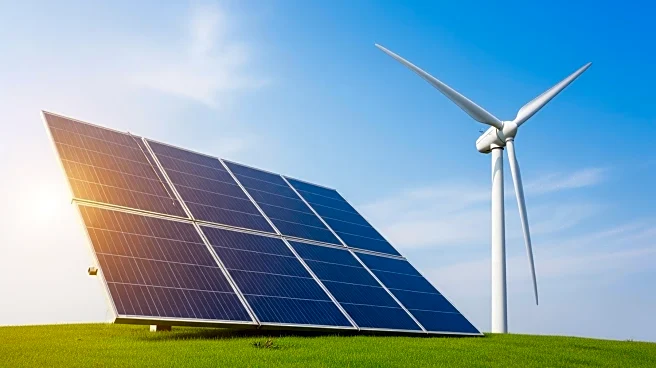What's Happening?
The GST Council has announced a significant reduction in the Goods and Services Tax (GST) on renewable energy devices and related parts, lowering the rate from 12 percent to 5 percent. This decision, effective from September 22, 2025, is part of broader tax rationalization reforms aimed at promoting clean energy adoption in India. The reduced GST rate applies to various solar power-based devices, including solar generators, lanterns, cookers, and water heaters, as well as photovoltaic cells. Wind mills, bio-gas plants, and waste-to-energy devices also benefit from this tax cut. The Council has additionally lowered the GST on non-lithium-ion batteries from 28 percent to 18 percent, while the rate for lithium-ion batteries remains unchanged. Prime Minister Narendra Modi has endorsed the move, highlighting its potential to ease living conditions and strengthen the economy. Industry leaders have praised the decision, noting its potential to accelerate India's clean energy transition and make solar installations more accessible.
Why It's Important?
The reduction in GST rates for renewable energy devices is a pivotal step in India's efforts to transition to clean energy. By lowering the cost of solar and wind installations, the government aims to make renewable energy more affordable and accessible, thereby encouraging wider adoption. This move is expected to boost energy security, reduce carbon emissions, and decrease reliance on fossil fuels. Industry experts believe the tax cut will enhance the financial viability of renewable energy projects, attract investment, and stimulate growth in the sector. The decision aligns with India's climate action commitments and its goal of achieving self-reliance in energy production. Additionally, the reduced GST rates are likely to foster job creation and support domestic manufacturing, contributing to economic growth.
What's Next?
The implementation of the reduced GST rates is anticipated to lead to increased project pipelines and faster capacity expansion in the renewable energy sector. As the tax cuts make renewable power generation more cost-competitive, demand from distribution companies and corporate buyers is expected to rise. The government may continue to focus on supportive schemes for the electric vehicle sector to ensure its growth is not adversely impacted. Industry stakeholders are likely to monitor the effects of these reforms on project costs and tariffs, with potential adjustments in pricing strategies to reflect the tax benefits. The move may also prompt further policy initiatives aimed at enhancing the competitiveness of India's renewable energy industry.
Beyond the Headlines
The GST reduction on renewable energy devices could have broader implications for India's energy policy and economic landscape. By addressing the inverted duty structure and streamlining refund mechanisms, the government is facilitating liquidity for manufacturers and developers, which could ease cash flow and support capacity expansion. The tax rationalization is timely, coinciding with India's ambitious targets for domestic manufacturing self-reliance and efforts to scale up green hydrogen mobility solutions. As renewable energy becomes more cost-effective, it may drive stronger demand from various sectors, including utilities and industries, fostering a more sustainable energy ecosystem.










